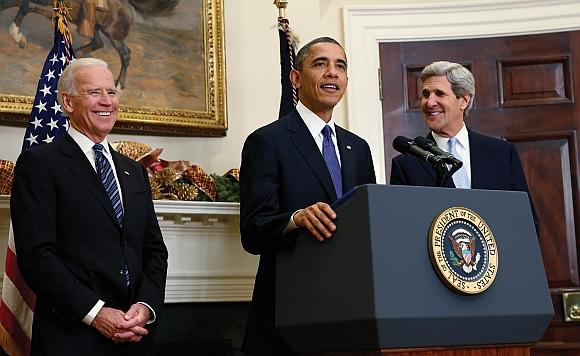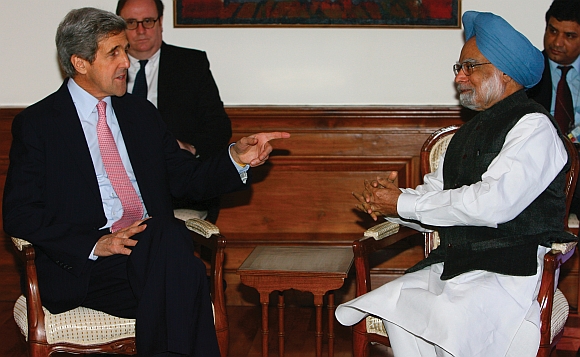
Leading South Asia experts, who have interacted closely with Senator John F Kerry, the chairman of the powerful Senate Foreign Relations Committee, have hailed his appointment as the new secretary of state to succeed Hillary Clinton. Aziz Haniffa reports.
Experts predicted that he would be catalytic toward further advancing US-India relations and enhancing US-South Asia relations in general too.
The choice of Kerry, Massachusetts Democrat and erstwhile unsuccessful Presidential nominee in 2004 -- had expressed a strong desire to replace Clinton, who is retiring -- was a veritable no-brainer after Obama's widely-rumored first choice to succeed Clinton, UN Ambassador Susan Rice withdrew from consideration.
Jonah Blank, till recently policy director for South Asia on the Majority Staff of the Senate Foreign Relations Committee and key advisor to Kerry, told India Abroad, "John Kerry's diplomatic skills are second-to-none.
He's got the patience, the experience, and the knowledge-base to represent the nation's interests deftly throughout the world."
Blank, now the senior political scientist at the Rand Corporation, was also the director of the South Asia policy team for Kerry's 2004 Presidential campaign.
"Senator Kerry has already demonstrated his subtle, but effective, negotiating style on numerous diplomatic missions over the past four years as the Senate Foreign Relations Committee chairman," he said.
"The most widely reported of these missions involved sensitive talks with Afghan President (Hamid) Karzai and Pakistani military and civilian leaders." Blank observed that one of the most important tools in Kerry's diplomatic kit was his ability to speak to foreign leaders.
"He can grasp the political needs and challenges of presidents and prime ministers, in a way nobody who hasn't had to face an electorate could truly appreciate," he said.
Speaking specifically about Kerry's stance toward India, Blank said he could "be expected to be a strong champion of the US-India relationship.
He was one of the key movers behind the passage of the civil nuclear deal, and consistently supported India on issues ranging from counterterrorism to increased economic engagement."
Blank took strong exception to the contention by some critics, particularly in New Delhi, including the likes of India's former ambassador to Pakistan, G Parthasarathy that Kerry wasn't tough on Pakistan, especially for the Inter-Services Intelligence -sponsored terrorism through proxies like the Laskhar-e-Tayiba.
"Senator Kerry doesn't see peace in South Asia as a zero-sum game- neither India nor Pakistan 'wins' when the other one 'loses," Blank argued. "With this in mind, he led Congress to pass the Kerry-Lugar-Berman Act. This landmark legislation drastically shifted US aid to Pakistan from military hardware to civilian development."
"It tripled the funds available for building roads, clinics and schools, while imposing the strictest standards to date on US military aid. That's good for the people of Pakistan -- and good for the people of India," he said.
Blank, who worked on the development of the Kerry-Lugar-Berman legislation, pointed out that "it contained the toughest language Congress had every adopted toward ISI-sponsored terrorist groups."
Blank's sentiments were echoed by Lisa Curtis, another former Congressional staffer who also served on the Senate Foreign Relations Committee and interacted with Kerry.
She told India Abroad, "Senator Kerry was deeply involved with US policy toward South Asia as chairman of the SFRC and when things became particularly sticky in the region, like during the 2009 elections in Afghanistan and the Ray Davis case in Pakistan in 2011, Kerry stepped in and used his personal diplomatic skills to smooth out the situations and salvage US policy in two pivotal countries."
Curtis, an erstwhile policy analyst and researcher with the CIA and currently head of the South Asia program at The Heritage Foundation, said that Kerry understood the importance of the Afghanistan mission and would likely advocate for continued robust engagement there even as the US combat forces withdrew."
She acknowledged. "Some Indians seem to view Kerry as an apologist for Pakistan because of his steadfast support for the country, but that characterisation does not reflect his overall record on South Asia."
"Kerry has also been a strong supporter of the US-India relationship and recognises India's growing importance to US policy in the broader Asia region," Curtis said.
"Even though Kerry has shown unusual patience with Pakistan, he has also shown sensitivity toward Indian concerns in the region. He is likely to pursue pragmatic and balanced policies in South Asia in an effort to avoid antagonising either India or Pakistan."
Curtis warned that Kerry would have to guard against any temptation to try to involve the US more directly in the Kashmir imbroglio.
"Even with his practiced diplomatic skills, Kerry would be walking into a hornet's next if he tried to mediate between India and Pakistan on their decades-old dispute," she said.
Dhruva Jaishankar, a rising star in US policy wonk circles, who is now with the German Marshall Fund in DC, also took on Kerry's critics, arguing that "there's room for some slightly nuanced analysis in Kerry's nomination."
...

"First, having followed the progression of the civil nuclear agreement in Congress, I would stress that Kerry's support during the committee stage in the Senate, of what later became known as the Hyde Act, was crucial," he said.
"In fact, if one were to re-read reports of Congressional hearings on the nuclear agreement from April 2006, you would see that Kerry -- who then often chaired the committee in Joe Biden's absence -- actually objected to proposed amendments to the Senate bill proposed by his junior colleague Barack Obama, amendments that would have been unacceptable to India."
Jaishankar observed that portraying Kerry as anti-India was unfair as he was far more appreciative of Indian concerns than either the President or Hillary Clinton. Jaishankar also said it was important 'not overestimate the role of individuals, particularly in the current set up at the state department, in influencing policy.
"In this administration, Pakistan policy is still being led primarily out of the White House, and -- in particular -- by the counterterrorism shop at the National Security Council," he said. "The intelligence community and Pentagon have a lot of say, often overruling senior State Department officials."
He cited the examples of the late US representative for Afghanistan and Pakistan Richard Holbrooke and the US Ambassador to Islamabad Cameron Munter.
Jaishankar said, "I don't mean to appear an apologist for Kerry. He may not be a very effective secretary of state. At the same time, by branding him as 'anti-India' or 'pro-Pakistan', we risk missing an opportunity to work constructively with America's top diplomat for the next four years."
Jaishankar's mentor, Stephen P Cohen, the doyen of South Asia experts, also hailed Kerry's appointment.
"It's a really good appointment because he's such an experienced guy with depth and substance as much as Hillary and he knew the region well. I am not sure about all the people and major players as much as Hillary, but it's a good choice," he said.
Cohen also predicted that Kerry would "probably change the people at the top at the state department -- the deputy secretary, the Under Secretaries, and other senior positions," and bring in his own team.
He disclosed that "They are going to fold the Af-Pak office and it will be back in the South Asia bureau," under the assistant secretary of South Asia. "Not having it as a separate entity will make the policy toward South Asia more efficient and coherent and this should put the focus back on South Asia as a region with India and Pakistan," he said.
Cohen also scoffed at Kerry's critics who view him as pro-Pakistan, saying that "I've never seen any indication that he's pro-anything except American and pro-American in terms of US national interests and security. So, to interpret him as one way or the other is foolish."
Karl F 'Rick' Inderfurth, former assistant secretary of state for South Asia during the Clinton administration, was also in sync with this consensus.
"There are very good reasons why India should welcome Senator John Kerry as the next US Secretary of State," he said. "First, he is a true Friend of India. He 'gets it' about India's emergence as an Asia-Pacific and global power -- and that this is in America's interest."
Inderfurth, currently with the Center for Strategic and International Studies as the head of its Wadhwani Chair on US-India Policy Studies, also said, "Senator Kerry was a strong supporter of President Obama's endorsement of India to become a permanent member of the UN Security Council."
He added that Kerry knew a great deal about India's neighborhood -- especially Pakistan and Afghanistan -- and the challenges these two countries present.
Inderfurth said, "Kerry knows first hand the pitfalls of over-involvement and over-extension in US foreign policy, whether it be in Vietnam decades ago or Iraq more recently."
Kerry's recent statements about how he feels about Washington's relations with India came when he convened confirmation hearings for Obama's nominee Nancy Powell to be the US ambassador to India on February 7, 2012.
In his opening remarks, Kerry said, "On all of the most critical global challenges that we face, India really has a central role to play. And that means that Washington is going to be looking to New Delhi not only for cooperation, but increasingly for innovation, for regional leadership. India's growing significance has been clear to many of us for some time now."
He added, "Republicans and Democrats alike understand the need to capitalise on the democratic values and strategic interests that our two countries share. And that is why it is important that we work together every day -- as I believe we are right now -- to further cultivate the relationship."
Kerry predicted, "In the coming years, I hope our two countries can deepen our cooperation throughout Asia, not based on any common threats, but on the bedrock of shared interests and values."
He said, "One area that is showing signs of promise -- especially on economic cooperation -- is the India-Pakistan relationship. I hope both countries can seize this moment to break with the perilous and somewhat stereotyped politics of the past."
Over the years, Kerry has also been familiar with Indian-American community, both in his own state with close friends and longtime fundraisers like Ramesh Kapur and Reshma Saujani, and also across the country, where he has been hosted several times by community groups and has been the beneficiary of their largesse toward his campaign coffers.
...